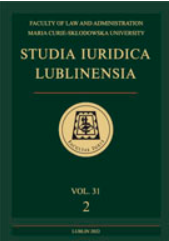Is There Any Morality Here? Richard Posner’s Economic Approach to Judge Behavior
Is There Any Morality Here? Richard Posner’s Economic Approach to Judge Behavior
Author(s): Anna TomzaSubject(s): Law, Constitution, Jurisprudence, Law on Economics
Published by: Wydawnictwo Naukowe Uniwersytetu Marii Curie-Sklodowskiej
Keywords: judicial behavior; human nature; Posner; behavioral jurisprudence theory
Summary/Abstract: Richard A. Posner in American jurisprudence is known mainly for his research on the economic analysis of law. Its purpose is to force the view that morality is not the most important value in law – this value is the maximization of goods. Posner believes that the relationship between morality and law begins and ends with lectures on law. The texts, judgments, and above all class discussions shape the morality of lawyers. And that’s it. Law enforcement lawyers who issue opinions and decisions always pursue only one goal. This goal is to maximize goods. These goods vary, but they all stem from the economic understanding of maximizing happiness. The creator of the economic theory of goods maximization in the process of human decision-making is Gary S. Becker. From his views and works, Posner derives the conceptual framework, methodology, and assumptions of the economics of law. Becker’s views are based in part on Jeremy Bentham’s utilitarianism. Linking these concepts to the law means Posner will have a different vision of man and his nature than most American thinkers. These studies are part of Posner’s thought and concern of judge behavior. The purpose of this article is to present Posner’s economic approach to judicial behavior as part of the currently thriving behavioral jurisprudence theory in American jurisprudence.
Journal: Studia Iuridica Lublinensia
- Issue Year: 31/2022
- Issue No: 3
- Page Range: 255-269
- Page Count: 15
- Language: English

